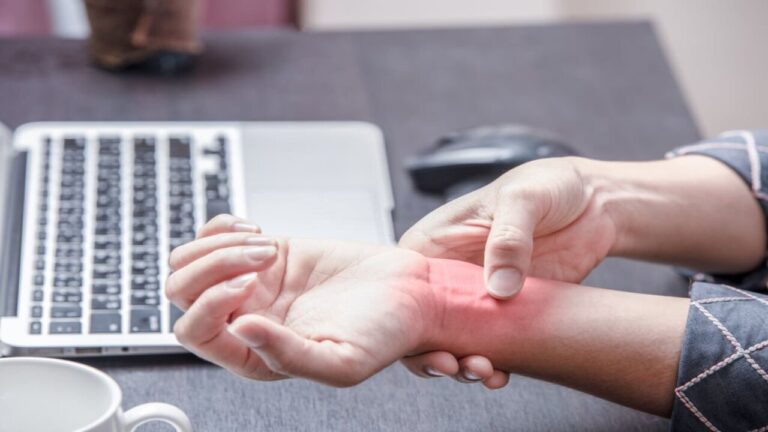Symptoms of neck injuries vary from condition to condition, but they generally include pain, numbness, and general discomfort. You should visit a doctor in the immediate aftermath of a neck injury, as waiting too long to get treatment could jeopardize your health. Without treatment, you could lose your full range of motion and struggle with other complications.
Naples Community Injury Center offers comprehensive treatment to those suffering from neck injuries in Southwest Florida. Through a customized treatment regimen, you can regain your health. Call (239) 369-9109 to make an appointment.
Symptoms of Neck Injuries That Require Medical Attention

Mayo Clinic notes that some symptoms that could point to a serious neck injury include:
- Numbness. A soft-tissue injury in the neck can strain or even tear nerves, reducing sensation in the affected area.
- Pain and discomfort. Even a small twinge could point to an underlying issue that a professional should evaluate.
- Headaches. Pain can radiate from the neck to the head, causing migraines and general malaise.
- A limited range of motion. If it hurts too much to move your head in a certain direction, this could indicate a neck injury. Keeping the area immobilized for too long could cause the muscles in your neck to atrophy, leading to further complications.
- Fatigue. A neck injury can prevent you from getting a full night’s rest, causing chronic fatigue.
Other symptoms you could experience include muscle spasms and ringing in the ears.
What Conditions Could These Symptoms Indicate?
Per MedlinePlus, if you’re experiencing any of the symptoms listed above, you could have:
- A herniated disc. Your neck and spinal cord comprise discs filled with a jelly-like center called a “nucleus.” When ruptured, the nucleus may push through the disc and put pressure on a nearby nerve.
- Whiplash. Whiplash generally arises from accidents such as rear-end collisions. Here, your neck snaps back and forth, like the cracking of a whip. In the days to follow, you could experience numbness, limited mobility, and headaches.
- A fractured disc. If you have a broken bone in your cervical spine, this could manifest as neck pain.
- Sprains and strains. A neck sprain or strain could affect the joints and other connective tissues in the area.
These injuries can result from collisions, falls, assaults, and other incidents. While some may heal on their own, others need treatment to speed up the body’s natural healing process.
What to Look Out for After Suffering a Neck Injury

You should use caution when completing your daily tasks after a neck injury. Even nodding your head can send jolts of pain through your body. After you suffered an injury, even if you don’t think it’s serious, you should visit a healthcare provider. As noted, if you wait too long to seek care, your condition could worsen.
You should immediately consider medical attention if:
You’re in Serious Pain
If your neck injury prevents you from going about your day-to-day life, you should visit a doctor. They can diagnose your condition and explain what options you have for mitigating your discomfort. They may recommend physical therapy or prescribe pain relief medications.
Your Pain Lasts for Several Days
You could have a serious condition if you experience pain for several days after the incident. Don’t live in uncertainty about your health; schedule an appointment with a care provider.
The Pain Spreads to Your Arms and/or Legs
The longer nerve damage persists, the more nerve fibers get destroyed. This means that what was once a neck injury can become an all-encompassing condition, affecting your mobility, work schedule, and quality of life.
The Treatments for a Neck Injury
Your ideal treatment plan following a neck injury depends on many factors, including the cause of your condition, your age, and whether you have any pre-existing health conditions. By conducting a physical examination and running lab tests, your doctor can diagnose your condition.
Then, they may recommend one or a combination of the following treatments:
- Medications. Your doctor will work with you to determine what medications could promote healing and alleviate pain.
- Posture changes. You may have neck pain if you have poor posture. This is common in people who have desk jobs. Your physician can work to correct the issue and restore your health.
- Lifestyle changes. Some small alterations to your lifestyle could reduce the pain your neck injury causes. For instance, the less weight you have on your body, the less strain on your bones and muscles. Limiting your caloric intake could be one part of your treatment plan.
- Physical therapy. A trained professional can guide you through some gentle exercises and stretches that could strengthen your neck muscles and reduce pain. They will assess your condition and adjust your therapy plan as needed.
- Chiropractic adjustments. Using controlled force, a chiropractor can use their hands or a specialized tool to align the bones in your neck. The specific technique they use depends on your situation.
- Electrical stimulation (E-STIM) therapy. Here, a physician puts electrodes near the problem area, then emits painless magnetic waves through the tissue. These aim to break down scar tissue and promote circulation.
How Long Does Treatment for a Neck Injury Last?
The length of your treatment regimen depends on many things. You could start feeling relief within days of starting treatment, or you may require a longer recovery period. Your physician should constantly monitor your health and make changes to promote healing. This involves listening to your concerns, running tests, and staying abreast of the latest chiropractic advancements.
Schedule Your First Appointment With Naples Community Injury Center
For more than two decades, Naples Community Injury Center has helped countless Floridians feel better after a neck injury. If you’re experiencing symptoms of a painful condition, we want to help. We can implement a customized treatment plan that aims to better your quality of life.
Dial (239) 369-9109 to connect with our team.







